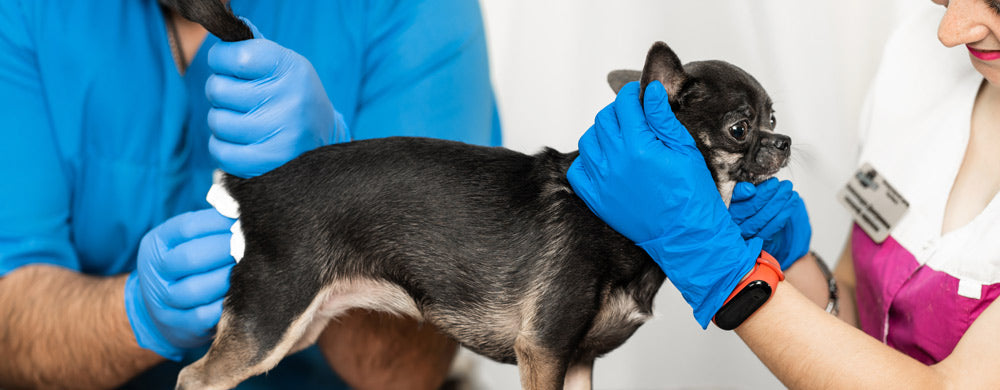Your basket is empty

Common Dog Health Issues a New Owner Should Know About
July 08, 2021 7 min read
Getting a new dog or a puppy is exciting, and you probably can’t wait to get started caring for your newest family member. But even the healthiest dog can get ill from time to time, so it’s important to know about some of the most common health issues in dogs.
So, what are the most common dog health issues? Allergies, digestive problems, urinary tract issues, clogged anal glands, ear infections, dental disease, parasites, and obesity are all common ailments that can affect dogs.
What Are the Most Common Dog Health Issues?
To help you recognise the most common dog health problems and the best ways to manage them, we’ll be explaining a little more about each one, including symptoms, causes, and treatment methods.
❊❊❊
Allergies
Allergies occur in dogs when their immune system overreacts to a substance. When this happens, the immune system sends histamines to the area, causing inflammation, swelling, and itching.
There are a few different types of allergies in dogs: environmental allergies, food allergies, and flea allergies.

Environmental allergies (also known as atopic dermatitis) are an abnormal immune response to something your dog encounters in their surroundings, be it inside or outside. Common environmental allergens include grass, pollen, dust, and mould.
In dogs with food allergies or hypersensitivities, antibodies are made against a type of food. In order for an allergy to form, antibody production is needed, so food allergies normally develop after long-term exposure to a type or brand of food.
Proteins are the most common food allergens in dogs, which includes lamb, chicken, beef, chicken eggs, soy, and gluten.
Flea allergies are very common in dogs. When a flea bites your dog, they inject a little bit of salvia into their skin. The antigens or proteins found in the salvia cause extreme itching in dogs with flea allergy dermatitis.
Symptoms and treatments
Common symptoms of dogs with allergies include:
-
Hives
-
Itchiness
-
Sneezing
-
Red or inflamed skin
-
Swollen face, eyelids, earflaps, ears, or lips
-
Dry, crusty, or oily skin
-
Itchy ears
-
Fur loss
-
Vomiting
-
Diarrhoea
Unfortunately, there is no cure for allergies in dogs, but they can be managed by reducing triggers or using various treatments.
 Avoiding triggers is one of the best ways to deal with allergies in dogs. Reducing your dog’s exposure to an allergen can help decrease their symptoms.
Avoiding triggers is one of the best ways to deal with allergies in dogs. Reducing your dog’s exposure to an allergen can help decrease their symptoms.
Speak to your vet if you suspect your dog has an allergy to something. They may prescribe antibiotics, steroids, or steroid skin sprays to help reduce infection and itchiness.
Immunotherapy and skin supplements can also be effective. The latter can help improve your dog’s skin and coat but contact your vet first before using any.
Our OMEGA fish oil supplement and SALMA Scottish salmon oil are great options for dogs with skin issues. They promote healthy fur and help soothe dry and itchy skin. Ideal for dogs who need a little helping paw in achieving a soft and shiny coat!
❊❊❊
Digestive Issues
Digestive issues in dogs can have a number of causes, from a food allergy to something more serious like canine parvovirus. Abruptly changing your dog’s diet, inflammatory bowel disease, certain medications, trauma, toxins, infectious agents, overeating, and foreign objects can also cause digestive issues.
Common symptoms of gastrointestinal problems in dogs include:
-
Diarrhoea
-
Constipation
-
Vomiting or regurgitation
-
Loss of appetite
-
Abdominal pain or tenderness
-
Bloating
-
Straining to defecate
-
Blood or mucus in stool
-
Flatulence
If you notice any of the above signs in your dog, it’s important to get them checked out at a vet straight away just to be on the safe side.
 Specialised diets, supplements, or other medications may be suggested if your dog has digestive issues caused by a food allergy, sensitive stomach, or inflammatory bowel disease.
Specialised diets, supplements, or other medications may be suggested if your dog has digestive issues caused by a food allergy, sensitive stomach, or inflammatory bowel disease.
Our TUMMY probiotic and prebiotic supplement is designed specifically for dogs and puppies with sensitive stomachs. It helps support your dog’s digestive function and promotes a healthy gut thanks to a 5-strain probiotic blend of bacteria. If you need help with diarrhoea, you can try out GUTSY tummy suspension that helps to control diarrhoea and other stomach upsets as well as to provide soothing relief to your dog's gut.
❊❊❊
Mobility Issues
While old age is a common cause of decreased mobility in dogs, it can also strike in young dogs. Arthritis, hip dysplasia, neurological disorders, broken bones, spondylosis, obesity, malignant tumours, trauma or injury, spondylosis, IVDD (Intervertebral Disc Disease) are some causes of immobility in dogs.
 The latter is a congenital disease that is largely seen in dogs with very short legs like French Bulldogs and Dachshunds.
The latter is a congenital disease that is largely seen in dogs with very short legs like French Bulldogs and Dachshunds.
Symptoms of mobility issues in dogs include:
-
Limping
-
Walking slower than normal
-
Struggling to stand up, sit, or go up steps
-
Pain or stiffness
-
Shifting the weight onto back or front legs
-
Reluctant to perform normal activities such as going on walks
-
Slipping when walking or getting up
Treatment will vary depending on the cause of your dog’s mobility issues. Arthritis and hip dysplasia can be managed by making adjustments to your home (like using rugs, ramps, and paw grip socks), giving your dog a well-balanced diet, prescribed pain or anti-inflammatory medications, and joint supplements.
Our MOBI joint glucosamine supplement and MERIC turmeric-based supplement are ideal for dogs with mobility problems. Both work efficiently to keep your dog’s joints strong and healthy.
❊❊❊
Urinary Tract Issues
Urinary tract issues are another common ailment that can affect dogs, such as stone/crystal formation in the bladder or urethra, bladder inflammation/infection, stress, incontinence, cancer, spinal cord abnormalities, and trauma.
If your dog is suffering from urinary tract problems, they may have symptoms such as:
-
Fever
-
Straining to urinate
-
Passing no urine or only a small amount
-
Bloody or cloudy urine
-
Incontinence or dribbling urine
-
Crying or whining when urinating
-
Urinating excessively
-
Urinating in the house
-
Strong-smelling urine
-
Licking around the urinary opening
-
Weight loss
-
Drinking more water than normal
-
Changes in appetite
-
Lethargy
-
Vomiting
-
Back pain
 Any of the above symptoms should be investigated further by your vet, especially if your dog is struggling to urinate.
Any of the above symptoms should be investigated further by your vet, especially if your dog is struggling to urinate.
Urinary tract infections and kidney issues are usually treated or eased with antibiotics, pain relief medication, specialised diets, and supplements like BERRI.
BERRI contains a blend of cranberry powder, D-mannose, liquorice, astragalus root, nettle seed, and marshmallow root to support your dog’s kidney and bladder function.
❊❊❊
Scooting and Anal Gland Problems
Scooting is when your dog drags their bottom across the floor or carpet and is normally caused by an anal sac problem. Anal sacs are located on either side of your dog’s anus and assist your dog with marking their territory.
These glands can become clogged or injured, which is when you will normally notice your dog scooting. However, other issues like parasites or allergies can also cause dogs to scoot.
Signs of an anal sac problem in dogs include:
-
A foul fishy odour
-
Scooting
-
Pain when defecating
-
Biting or licking around the bottom or lower back
-
Looking at back end abruptly
-
Sitting down in discomfort abruptly
Clogged anal glands can be treated by medication and simply by emptying them. Surgery may be necessary with dogs with recurrent anal gland problems.
You can help prevent issues with your dog’s anal glands by ensuring they maintain a healthy weight, are fed high-quality dog food, and get enough fibre in their diet. Fibre is particularly important as it helps firm up your dog’s stools.
Digestive supplements like SCOOTER can also be effective in supporting your dog’s anal sac and gland function.
❊❊❊
Parasites
Another issue to keep an eye out for in dogs is parasites. Parasites can be internal (heartworms), intestinal (hookworms, ringworms, roundworms, etc) or external (fleas, ticks, lice, and mites).
 Symptoms vary for each parasite, but symptoms of fleas include intense itchiness, flea dirt (small dark grains on your dog’s skin), scabs or sores, hair loss, and pale gums.
Symptoms vary for each parasite, but symptoms of fleas include intense itchiness, flea dirt (small dark grains on your dog’s skin), scabs or sores, hair loss, and pale gums.
The best way to deal with parasites is to stop them from infecting your dog in the first place by using preventative treatments on a regular basis.
You should keep your dog’s basket/bedding, food and water bowls, and environment clean and tidy. Remove droppings from your garden or wherever your dog uses the bathroom at least once a week too.
❊❊❊
Ear Infections
Over 20% of dogs have some type of ear disease. In general, dogs are more susceptible to ear infections than humans due to the shape of their ear canal. Dogs with floppy ears like Basset Hounds and Cocker Spaniels are particularly at risk of ear infections.
A lot of infections are the result of ear mites, excessive ear cleaning, wax build-up, skin allergies, and growths.
Some of the most commons signs of an ear infection in dogs are:
-
Foul-smelling discharge from ears
-
Redness, swelling, or heat around ears
-
Itchy or tender ears
-
Head shaking or tilting
-
Face/head rubbing (typically across the floor)
-
Scabs or crusting on the side of the face and inside the ear
Contact your vet if you think your dog has an issue with their ears. They may take a discharge sample to figure out the cause of the infection, and prescribe ear drops, anti-inflammatory pain relief, or antibiotics. You should keep your dog’s ears clean as they heal.
You can help prevent ear infections by performing regular ear checks and ear cleaning. You should also treat any skin conditions your dog has and dry/clean their ears thoroughly after swimming.
❊❊❊
Obesity
Did you know that around 40% of dogs in the UK are overweight? Unfortunately, this is a common issue that is estimated to get even worse.
 Obesity in dogs is normally caused by lack of exercise and improper diet, but your dog’s age, breed (some breeds are more likely to become overweight), and sex can also be contributing factors.
Obesity in dogs is normally caused by lack of exercise and improper diet, but your dog’s age, breed (some breeds are more likely to become overweight), and sex can also be contributing factors.
Some medications and diseases like hypothyroidism and insulinoma can also cause weight gain in dogs.
Treating obesity in dogs is done by decreasing their caloric intake and increasing their exercise levels. You should speak to your vet to get advice on the right food, portion sizes, and exercise options.
Removing treats and table scraps from your dog’s diet is crucial, as is selecting dog food to help your companion lose weight. There are many commercial dog foods available that are designed for weight loss, but ones that are high in protein but low in weight can be particularly effective.
VITIA, our advanced multivitamin supplement, is an excellent addition to your dog’s weight loss journey as it provides them with essential nutrients to keep them strong and healthy.
----
Final Thoughts
Whether you’re a new or experienced dog owner, it’s important to know about some of the most common issues in canines. This will help you identify when there’s something not quite right with your four-legged friend, allowing you to determine the best course of action and right treatments.
As always, if you’re worried about your dog or notice anything slightly off, don’t hesitate to get them checked out at a vet.
Also in Pet Advice

Should You Add Water to Your Dog’s Kibble? Here’s What the Science Says
August 14, 2025 7 min read
Should you add water to your dog’s kibble? Discover the science-backed pros, cons, and better alternatives like bone broth and fresh food to improve hydration, digestion, and overall canine health...

DIY Frozen Dog Treats Your Pup Will Love
June 27, 2025 4 min read
Summer heat can be dangerous for dogs, making hydration more important than ever. Learn how to spot signs of dehydration, boost your pup’s water intake, and create fun, frozen recipes to keep them happy and healthy all season long.

Why Is My Dog Scooting? Common Causes and How Diet Can Help
May 09, 2025 4 min read
If your dog is scooting or smells fishy, it could be due to blocked or irritated anal glands. Learn what causes blocked anal glands, which dogs are most at risk, and how simple dietary changes—like adding fibre and anti-inflammatory nutrients—can help prevent recurring problems.
